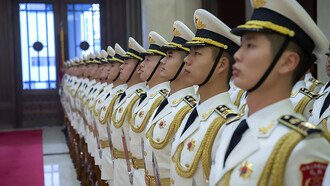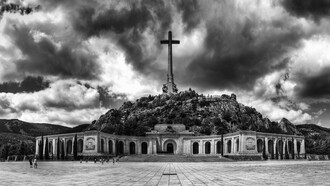Christy Lefteri's novel The Beekeeper of Aleppo (originally published in 2019) offers a poignant account of a family's arduous journey from war-torn Syria to a foreign land that offers little solace. The literary work sheds light on human rights violations and provokes profound contemplation on the subject of hospitality towards migrants. While the narrative is fictional, it offers a vivid depiction of the realities of the Syrian civil war, which began in 2011, and the subsequent mass displacement.
The Beekeeper of Aleppo adopts a narrative approach, predominantly through the perspective of Nuri, the beekeeper, to offer insights into the experiences and perceptions of migrants. It provides a lens into the challenges and complexities of European hospitality towards migrants and the refugee experience from a biopolitical perspective. By centering on Nuri's encounters and interpretations, the author provides a distinctive viewpoint on the refugee crisis, facilitating a more profound examination of Nuri's trauma, his sense of fragmentation, his resilience, and his struggle to make sense of a world turned upside down.
The strategic employment of flashbacks plays a pivotal role in the novel's effectiveness to deliver a sense of fragmentation. These vignettes offer a poignant contrast to the protagonists' circumstances in the United Kingdom, where they are seeking asylum. They provide a glimpse into the life of Nuri and his wife, Afra, in Aleppo, both before and during the war. The flashbacks vividly portray the intricacies of their former lives, including their residence, their social milieu, their son, Afra's enthusiasm for painting, and Nuri's dedication to apiaries. These recollections underscore the profound nature of their loss, extending beyond the mere loss of material belongings to encompass the loss of their sense of belonging, their identity, and their home.
The constant oscillation between past and present mirrors the refugees' experience of having their lives torn apart and their struggle to rebuild a new reality from the fragments of their past. The fragmented structure effectively conveys the sense of dislocation experienced by refugees, highlighting the difficulty of piecing together a coherent narrative when one's life has been so violently disrupted. Thus, the novel's structure, characterized by its alternating focus between the present journey and the past in Aleppo, serves to reinforce the overarching themes of fragmentation and displacement.
Biopolitical control
This fragmentation and disorientation, so effectively conveyed by the novel's structure, is not merely a literary device; it reflects a deeper, more insidious force at play. The refugees' struggle to rebuild their lives is further complicated by the biopolitical forces that govern their existence. These forces, often operating behind the guise of humanitarian concern and national security, exert control over every aspect of the refugees' journey, from their initial flight to their attempts to find sanctuary. Indeed, biopolitics, the management and control of life through various mechanisms, techniques, and rationalities, is a central theme in the novel. As the narrative unfolds, it becomes clear that refugee lives are profoundly shaped by border regimes, the often-dehumanizing structures of refugee centers, and the Kafkaesque bureaucracy of the asylum process.
These systems, ostensibly designed to manage and (re)direct life, frequently create conditions of expulsion, rejection, annihilation, and estrangement. Lefteri’s novel demonstrates how governments, prioritizing the perceived welfare and security of their own populations, often do so at the direct expense of refugees, investing heavily in deterrents and border control rather than humanitarian aid, revealing the underlying biopolitical mechanisms at play. For the protagonist, the constant fear and uncertainty surrounding the asylum process, the emphasis on proving his story in front of the authorities, and the dehumanizing nature of the refugee center all hint at these biopolitical mechanisms. The lead-up to the interview itself is a carefully orchestrated process of control: Nuri and Afra are subjected to checkpoints, scans, searches, and registration, forced to wait in a room with others who share their fear.
This establishes the power dynamic from the outset. The need to "prove his story," in particular, is key to comprehending the biopolitical aspects of asylum. When Nuri and other migrants must detail how they felt threatened at home and how they were forced to leave because of the risk of being killed in order to be granted asylum, the details they share are not simply verified for factual accuracy. Rather, they are collected by the authorities and assessed to determine if they fit into pre-defined categories and narratives that the state recognizes as legitimate—the narrative of the “genuine” refugee. This process echoes Foucault's concept of biopower, where the state gains control over populations not just through direct force, but also through the management of life itself. The authorities have the power to define what constitutes a “genuine” refugee and to judge the worthiness of their claim, effectively exercising the power to “make live and let die”. The interview itself exemplifies this power dynamic.
Nuri is asked seemingly arbitrary questions about Aleppo landmarks, market goods, and even his contact with ISIS, questions that have little bearing on his current need for asylum. He is forced to recount the painful details of his son's death, asked to recall "something special about him", and even made to sing the Syrian national anthem and discuss his reading habits. These seemingly irrelevant questions serve to further disorient and control Nuri, reducing him to a subject under scrutiny.
Nuri, therefore, is forced to perform his trauma, to recount his suffering in a way that conforms to the state's expectations, in order to be accepted. The asylum process becomes then a mechanism for deciding who gets to “live” (i.e., be granted asylum and have a chance at a new life) and who is left to “die” (i.e., be deported back). As Nuri's story is scrutinized, categorized, and ultimately judged, the process of narrating trauma for state approval becomes a form of biopolitical control. In this way, the refugees are not treated as individuals with rights and dignity, but as a population to be controlled, contained, and, in some cases, excluded. This focus on security and control, often justified in the name of national welfare, comes at the direct expense of the refugees' well-being, perpetuating their trauma and marginalization, and ultimately undermining the very notion of humanitarian protection.
Echoes of inhospitality
The interview process is just one facet of the broader system of control and inhospitality that refugees face. At the beginning of the novel, we find the characters at a refugee center where Nuri observes a billboard declaring that, “there are too many of us, that this island will break under our weight”. The unwelcoming atmosphere of the refugee center, evidenced by the billboard declaring 'too many of us,' immediately reinforces this sense of marginalization and underscores the challenges that lie ahead. This message of being unwanted is not merely a reflection of local sentiment; it is a manifestation of biopolitical control, where the state seeks to manage and limit the influx of refugees, framing them as a burden on resources and a threat to national stability.
Nuri's background as a beekeeper, where cooperation and harmony are essential for survival, provides a stark contrast to the hostility and fragmentation he encounters in the human world. This contrast underscores the biopolitical forces that disrupt human connection and create conditions of exclusion and marginalization. The billboard’s message of “too many of us” highlights the exclusionary nature of biopolitical control. It reinforces the idea that refugees are not individuals deserving of compassion but rather a mass to be managed, contained, and ideally, kept out. The hive, a symbol of community and belonging, is shattered for Nuri, just as his own sense of belonging and identity is shattered by the war and his displacement. The unwelcoming message of the billboard echoes this sense of brokenness, suggesting that the host country is unwilling to offer the same sense of community and support that Nuri observes in the natural world.
Nuri’s reflections on bees offer a powerful counterpoint to the human experience. He sees bees as “an ideal society, a small paradise among chaos,” where “the worker bees travelled far and wide to find food, preferring to go to the nearest field”. He cares for them, nurtures them, and monitors their health. However, this idyllic vision is shattered by the realization that “people are not like bees. We do not work together; we have no real sense of greater good”. This contrast underscores the human capacity for both cruelty and indifference, highlighting the stark reality of the refugees’ plight.
This disillusionment with human nature, so poignantly captured in Nuri's comparison of humans and bees, is further amplified by the bureaucratic labyrinth refugees must navigate, a system that seems designed to further dehumanize and disorient them. The stark contrast between the natural order he understands and the often arbitrary and impenetrable systems of human governance underscores the challenges facing those seeking asylum. Upon arrival in the UK, Nuri receives “a bunch of paper.
A packet from the Home Office: information about claiming asylum, eligibility, notes about screening, and notes about the interview process”. This overwhelming stack of documents, filled with complex legal jargon, presents a daunting challenge for asylum seekers. The sheer volume and impersonal nature of the paperwork symbolize the confusing and often impenetrable system refugees must navigate, while the complicated language further isolates them, making them feel trapped in a process designed to exclude them.
The trauma of reliving the past
The dehumanizing nature of the process is further emphasized by the advice Nuri receives: “Think about your story, how you got here, what happened along the way. They will ask you all sorts of questions, and you need to be ready because they will be emotionally difficult to answer”. This reveals the invasive and emotionally taxing nature of the asylum interview, where refugees are forced to relive their trauma for the chance at a new life. Refugees are not simply asked to recount their experiences; they are compelled to relive them, often in minute detail, for the benefit of officials. This process of forced recollection can be deeply traumatic, bringing back painful memories and re-exposing individuals to the very experiences they are trying to escape. The asylum interview, therefore, becomes a site of re-traumatization, where the past is not just remembered but relived.
The novel further emphasizes the pervasive nature of trauma through Afra's blindness. While initially presented as a possible physical injury from a bomb, it is later revealed that “the blindness [she is] experiencing is the result of severe trauma—sometimes our bodies can find ways to cope when we are faced with things that are too much for us to bear”. This diagnosis reveals the profound psychological impact of the war and their displacement. Afra's blindness becomes a physical manifestation of her trauma, a way for her body to shut out the unbearable reality of her experiences. It highlights how trauma can manifest physically, impacting not only mental but also physical well-being. Her blindness serves as a constant reminder of the trauma she has endured and the profound loss she has suffered, adding another layer to the novel's exploration of the lasting effects of violence and displacement.
Dehumanization and indifference
Afra's embodied trauma, manifested in her blindness, is mirrored by the systemic indifference inflicted upon refugees as they navigate the asylum process. The dehumanizing experience of registration, where individuals are reduced to mere categories, further compounds the sense of loss and alienation, highlighting the stark contrast between their inherent humanity and their treatment by authorities. Upon arrival in Greece, after having crossed the sea from Turkey, Afra and Nuri are brought to a registration center, which is depicted as chaotic and dehumanizing: “We were led away from the port, up a small hill, to the registration center for new arrivals: a large tent. The place was brimming with refugees and soldiers and police officers who were wearing blue-mirrored sunglasses […] Men in uniform and straight faces divided us into groups: single females, unaccompanied minors, single men with passports, single men without passports, and families”.
This scene underscores the reduction of individuals to categories, their identities stripped away as they are processed like commodities. The refugees’ desire for “papers so that they could exist in the eyes of the European Union” reveals the fundamental need for recognition and belonging, a need often denied to those fleeing persecution. This dehumanization, evident in the registration process, continues as refugees are moved from the initial point of processing to the often-bleak and inadequate accommodations provided for them. The stark reality of the refugee center, a place meant to offer sanctuary, further underscores the systemic indifference and the precariousness of their situation.
The refugee center itself is described in haunting terms: “There was something haunting about the island—half-finished crumbling properties, empty storefronts—as if the residents themselves had suddenly run out of there in a hurry, leaving the place to fall apart. Windows-like eyes opened into dark, uninhabitable buildings”. The dilapidated state of the center mirrors the broken lives of the refugees. The comparison to a “leper colony” and a “Nazi concentration camp” is shocking, yet it underscores the sense of isolation, confinement, and dehumanization experienced by those seeking shelter.
Hope and resilience
The dehumanizing nature of the registration process, in which individuals are reduced to mere categories, in conjunction with the protracted wait for asylum status, serves to exacerbate feelings of loss and alienation. This phenomenon underscores a pronounced dichotomy between an individual's inherent humanity and the treatment they receive from authorities. Yet, even amidst this dehumanization, Lefteri offers glimpses of hope and resilience. This resilience is perhaps most poignantly symbolized in the novel's closing scene, where Nuri and Afra, reunited with a friend at the refugee center, observe three hoopoe birds perched on a branch.
These migrant birds, arriving from the east with their "majestic crown of feathers," mirror the journey of the refugees themselves. As the three friends watch the birds take flight together into the "unbroken sky", the image evokes a sense of hope and possibility. The birds' flight symbolizes the potential for freedom and a new life, a future where the characters might finally escape the dehumanizing forces that have shaped their past. It is a powerful image of resilience, suggesting that even after experiencing unimaginable trauma and loss, the human spirit can endure and find hope for a brighter future.
Through Nuri and Afra’s experiences, Lefteri’s novel powerfully illustrates the biopolitical forces at play in the refugee crisis: the systems designed to manage and control populations often perpetuate suffering and marginalization. The Beekeeper of Aleppo serves as a poignant reminder of the human cost of these policies, urging readers to reflect on the ethical implications of how we treat those seeking refuge. Also, it urges readers to cultivate greater empathy and understanding for the plight of refugees and to challenge the dehumanizing narratives that perpetuate their suffering.
Notes
Foucault, Michel (2004). Society Must Be Defended: Lectures at the College de France, 1975-6. London: Penguin.
Lefteri, Christy (2020). The Beekeeper of Aleppo. London: Manilla Press.















